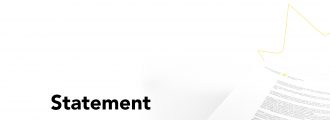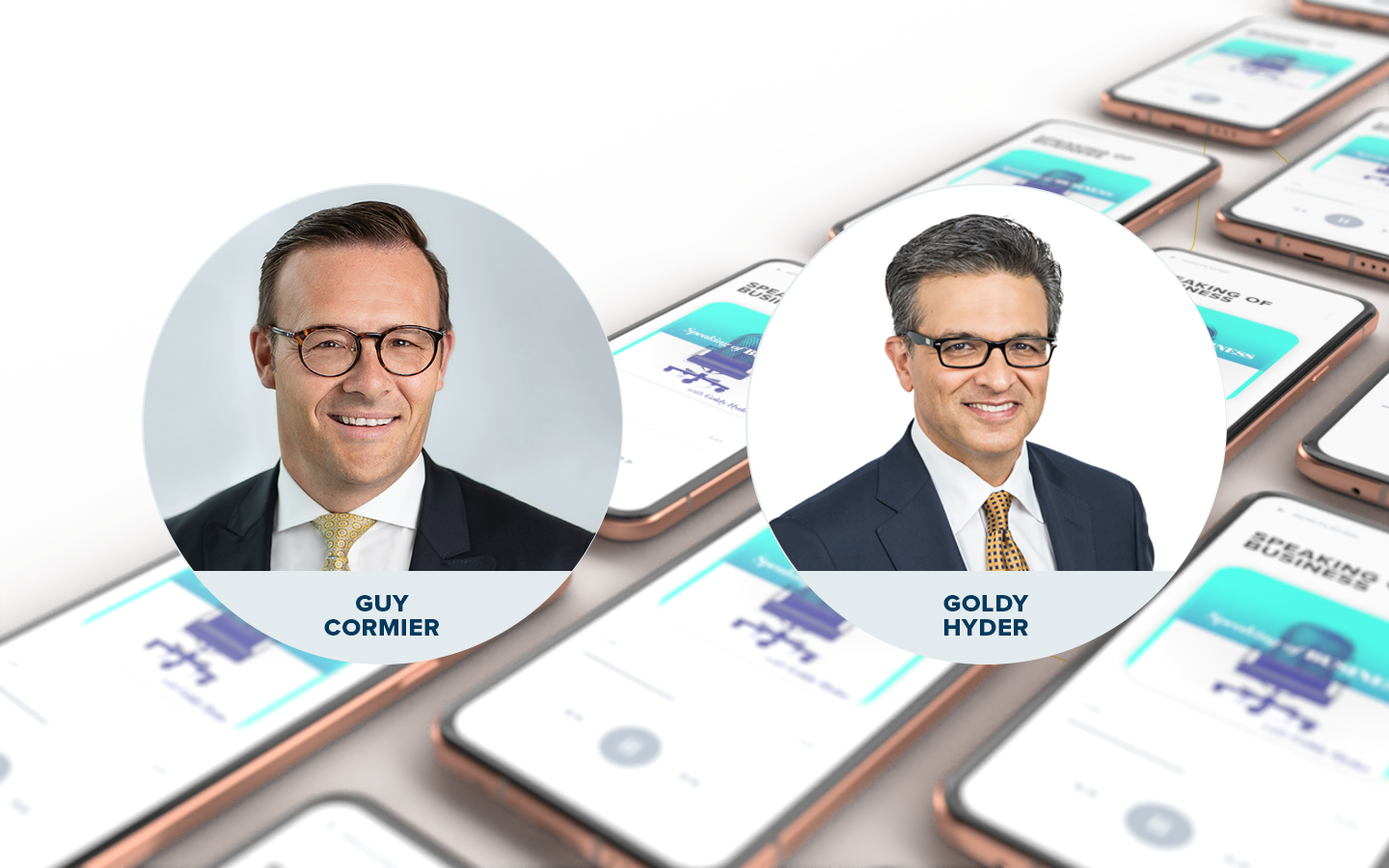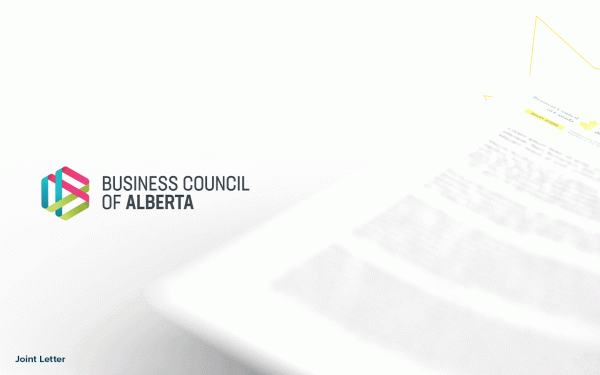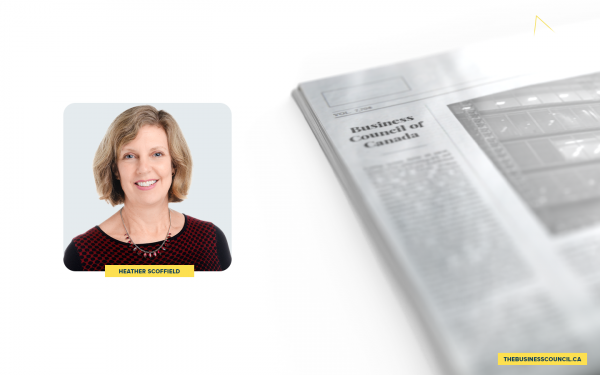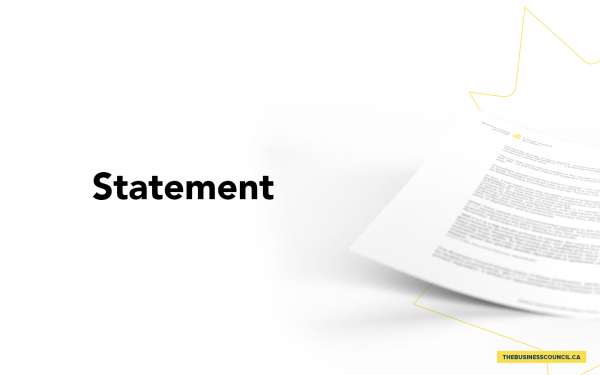Pressing the reset button on capitalism: how to build a more inclusive society
As Guy Cormier looks ahead to a post-COVID Canada, the president and CEO of the Desjardins Group says it’s time for all of us to embrace a new approach.
“Capitalism has lifted a lot of people out of poverty,” he says. “[But] at the same time, I think it’s quite obvious that there is some collateral damage.”
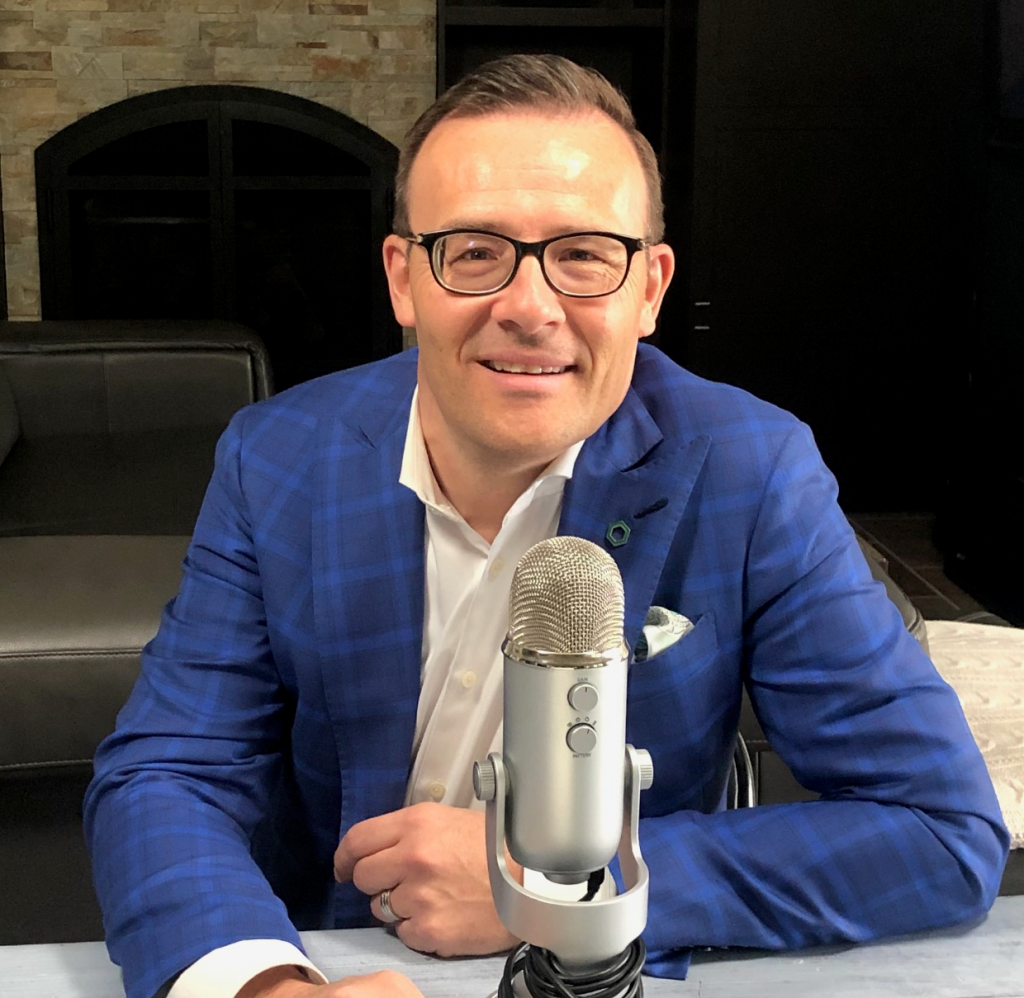
Cormier points to climate change and income inequality as examples of the myriad social challenges facing Canada. He says it’s time “to give capitalism a do-over” by ensuring that the post-pandemic recovery includes a strong focus on sustainable growth.
The pandemic brought home the importance of looking after one another, he says. In tandem with governments, businesses large and small stepped up to support their communities. Many people are now looking to corporate leaders to help tackle other pressing global issues.
“Citizens, employees, clients, suppliers will be key people … to remind all of us that we must try to see the future differently than it was before.”
In conversation with Goldy Hyder, Guy Cormier also talks about the importance of addressing mental health, and mentoring youth. Listen now.
Latest Podcasts
Transcript:
Guy Cormier:
We learned so much in the last year and a half, but also have time for strong reflection. How do I see my life, my company, the way I want to impact society? So I really, really feel that there is many people who will look at the next decade with a real purpose of doing things differently.
Goldy Hyder:
Welcome to Speaking of Business. I’m Goldy Hyder, president and CEO of the Business Council of Canada. We’ve all heard the analogies over the past year comparing the COVID-19 pandemic to a war. And it’s true, we’ve seen a war time response to the health emergency across Canada and around the world. But when any war ends, and this pandemic will end, communities begin to rebuild. Often, that involves change and learning from the past. What will Canada look like at the end of the pandemic? Will we change the ways we live, work, and interact with each other? Will our cities and towns look different? Will our healthcare system evolve? And will we find new ways to support each other after suffering so much loss?
Goldy Hyder:
My guest today believes the pandemic has given us the opportunity to press the reset button. What is his vision for an improved post-pandemic Canada? Let’s find out. Guy Cormier is president and CEO of the Desjardins Group and joins me now. Welcome to the podcast Guy.
Guy Cormier:
Hi Goldy, thank you very much. It’s a real pleasure to be with you today.
Goldy Hyder:
Well, I’m looking forward to the conversation. A little while back, you wrote a piece in the National Observer and called for, and I quote, “It’s time to give capitalism a do-over.” So I wanted to start there because that’s a pretty provocative statement. What do you mean by that?
Guy Cormier:
My point was just to put on paper the fact that the capitalism that we all know for 40, 50 years, and yes, this capitalism has lifted a lot of people out of poverty. At the same time, I think it’s quite obvious that there is some collateral damage. Yes, impact on climate, but the rise of some inequalities. Some of the people in our societies are still facing challenges or struggling. And at the same time, we are in a moment of our history where our governments are spending so much to invest in our economy and our society. So it’s really the right moment just to, like you said, press on the reset button and try to see if businesses should be or must be part of the solution of building this new economy.
Guy Cormier:
And we have done tremendous changes in the last decades, but it seems that we must look at the long-term perspective of our future, not only necessarily the short-term perspective and try to see if profits and communities, society are not mutually exclusive as concept or goals or targets, but are more interlinked than ever because we have seen in the pandemic how important it is to take care of our communities, of our seniors, of our employees. And at the same time, we have seen many supply chains that have been disrupted, maybe because we should have taken other decisions in the last years.
Goldy Hyder:
Some would say that’s essentially the call that we’ve heard coming out of the World Economic Forum for Stakeholder Capitalism. The idea, as you said, that we can co-exist. That profits and purpose aren’t mutually exclusive. That they can work together. So what have you been able to do at Desjardins even over the course of the last 15 months or so, not just to share that vision, but to start building on that vision in terms of actual actions?
Guy Cormier:
One of the aspect that I’m really pleased to be the head of Desjardins is that we are a co-op for more than 120 years. We are a co-op model with members who own our business and who are having a lot of interest in the way we manage the company and are asking me and are asking us to really manage Desjardins with not only a profitable perspective, but also enrich the lives of the people in the community. So for us, it was already in our values and it was already in our purpose. So how can we act in the same mindset that we have been for more than the centuries or during the pandemic? As an example, for us, it was important to keep all of our employees. So we have been able to keep our employees, no layoffs, and really try to help them to go through the pandemic. On the 48,000 employees who work across the country, nearly 40,000 have been able to work from home. It’s a way for us also to protect our employees and to protect the spread of the pandemic or the virus. So it’s one example.
Guy Cormier:
The other one is we decided to invest in a GoodSpark Fund of a $250 million from 2021 to 2024 across the country to help our youth, to help our seniors, to help innovation with entrepreneurs, just to try to see if we can do just as much as we can to help business leaders and community leaders to bring projects on the table and help them to attract investment and see if we can have a recovery that will be quicker and faster.
Guy Cormier:
And the last one for me that is really, really, really important is also the fact that as an employer, as a leader, we have tried as much as we can to help our clients who were doing business with us. So our entrepreneurs, our business members. So with many measures, relief measures, we launched a fund where we were able to give $10,000 per entrepreneur who were asking us if they were in need to just reshuffle their chain of operation or just to reorganize their offices and their operations to manage the pandemic and the health of their employees. So we’re giving $10,000 to these small, the SMEs. So it’s just a few examples where we feel that humbly as Desjardins has always been, we’ve tried to do as much as we can to help our entrepreneurs and our members.
Goldy Hyder:
Let’s drill down on that because a couple of things that you mentioned there I think are good themes for people to learn more about. You mentioned you focused on the employees. At the end of the day, people are at the heart of any business. How is this experience shaping the way you’re thinking about the learnings that are coming from how you take care of people and how you’re going to build Desjardins looking forward? And also in that same vein, all this talk about working from home and the hybrid and all these changes that may or may not take place, where do you land on that issue?
Guy Cormier:
Well, I think we have to be careful. I think at the beginning of the pandemic, it was totally new. It was really brutal, let’s put it this way. You work from the office five days per week, and overnight nearly, you work from home and you have to reorganize nearly all your life from the morning to the end of the day. So after a year now and a few months, it’s quite obvious that there is really some pros, but there is some cons too. And we have to be careful. And I know that it’s maybe easy to say, now it’d be a new world and people will work from home. From my perspective, there is many of our employees who are telling us, “You know what? I feel lonely at home. I need to just socialize with colleagues. I need to be in touch with some others.”
Guy Cormier:
There’s real projects where it’s really more efficient to be in the same room to work on this project. So I really feel that we will land, from Desjardins perspective, on an hybrid model where it’s not a one-size-fits-all. With 48,000 employees across the country, from B.C. to Maritimes and different kinds of work at Desjardins, we will have some employees who will be able to work from home five days per week and some others will have to be in the office five days per week. And in the middle, we will have some that will be able to be maybe 40-60, 50-50.
Guy Cormier:
And the other thing that is important for us and for me is that we will give a lot of leeway to our managers. They are the ones who know as much as they know about their employees, their needs. And we will mainly just to set some principles, some guiding rules, and we’ll trust our managers to do as much as they can to be sure that they manage with an understanding of the needs of their employees. So I really feel that we must be careful because there is still a lot of anxiety, distress, fatigue, and that’s where we are landing probably in the next few months with our employees.
Goldy Hyder:
Well, as you said, it’s not one-size-fits-all. And I know that in conversations we’ve had with our colleagues at the Business Council and other CEOs, that the issue of culture comes up. How do you build a culture if your employees aren’t a part of being, interacting with other employees in a personal way? That’s one area. But the other area, Guy, that you and I have talked about before, and I know it’s important to you, and we’ve heard it from business leaders across the country, and that is the issue of mental health. How concerned are you about the unseen pandemic, if you will?
Guy Cormier:
I think it’s a real issue right now and we have to be really careful and proactive. It’s not clear right now in my mind how the opening of our economy, of the society will have a huge impact or not on the situation of many of our employees or citizens that are facing some challenges right now. Is it only a question of just reconnecting with others? Is it only a question of being in touch, come back to the office and after a few months, you know what? I’ll feel in a better mood, a better shape and I’ll really feel that I’m back to kind of a normalcy? Or I really think that for some people, we’ll have to be really proactive and helpful for them because some of the issues that they have faced during the pandemic will stay for a while.
Guy Cormier:
And I feel that it’s in our role as business leaders, but also as employers to take care of them. So as an insurer, as a life and a disability insurer in Canada, we are working right now with this division to try to see how much can we be more proactive with some people that can be helpful for them, some call centers that are available for them. We ask our HR department to really innovate and try to be as close as they can with these employees. We ask our managers in any divisions. Actually we built a program with Queen’s University, IBM, Morneau Shepell, where we train all of the Desjardins manager in Canada to have special training, to be more accurate or helpful regarding mental health.
Guy Cormier:
And because even them personally, sometimes it’s a challenge to how do I act? How do I manage? How do I help an employee who needs my help? So we try to train them more proactively to be more specific or, not more human, they are human, but maybe more… a deeper understanding of the needs and try to see the kind of tools that we can bring to our employees. So, yes, it’s one of the things that not only keeps me up at night because I feel that we’re doing as much as we can, but it’s a team effort work regarding this issue.
Goldy Hyder:
Well, I’ve certainly heard from a variety of business leaders about this issue is the one that they’re most seized with in some ways beyond managing the COVID situation itself. And maybe you’ve seen this, but a number have pointed out that they’ve increased benefits coverages for their employees, for example, on mental health in specific. Have you noticed that trend at all?
Guy Cormier:
Yes, I’ve seen that for many of the businesses that we’re doing business with. They have requested us to see if we can be helpful on that side. We offered some of our expertise to many SMEs that we’re doing business with to help not only their employees, but even THE business leader, even THE entrepreneur, because for them to… Yes, our focus is on the employees of our clients and our members and our employees, but we are really, really careful too with our managers, but also the business leaders who own these companies, because for them, they are sometimes small entrepreneurs.
Guy Cormier:
And actually we launched a program to help them to have access to psychologists, to other entrepreneurs, some podcasts, just to help them because they feel lonely at one point and they have in front of their employees and in front of their clients and in front their stakeholders to really express how proactive they are, how solid they are. But at the same time, some of them are struggling. They have a family, the kids are at home. So we have and must help them. So as a financial group with, like I said, a strong insurer in our group, we decided to be really proactive with them.
Goldy Hyder:
Well, that’s great to hear that you’ve seen the trend towards supporting people through mental health. As I said, I think it’s that invisible thing and we all want to come out of it stronger. And speaking of coming out of it stronger, one of the things that seems to be a common theme around COVID-19, particularly in businesses, it has accelerated change. So my question to you then is how has the pandemic changed the way that you as as a leader or your business are thinking about social responsibility? Some of the issues we’ve talked about just touched on that. But how do we ensure that people are not left behind coming out of COVID? Because I think we all recognize that this hasn’t treated everybody the same. It’s discriminated quite a bit in terms of socioeconomically and there’s a risk of a K-recovery. What do you think we need to do to make sure that people are not left behind?
Guy Cormier:
Well, I think we must just continue this kind of discussion that we’re having right now. We need podcasts like that. We need moments to have a discussion with business leaders, with community leaders, not only because it’s, I hope, the end of the pandemic, but it’s to keep this discussion alive. And I’m really, really convinced that it will be the case because I really feel that more and more clients of our organizations, more and more members of Desjardins co-op will ask that as an organization, we are keeping in our mind all of these social issues that we’re facing in this country. I’m totally convinced that our employees will also be really proactive and will challenge us as business leaders to be sure that we keep in mind all the discussion that we had during the pandemic just to be sure that there is a before and an after pandemic.
Guy Cormier:
And I really feel that the social issues, the purpose of Desjardins, our goals, our targets, the way we manage our organization, our co-op, are more and more important for them. They are asking me more and more questions about what are we doing regarding parity? What are we doing regarding youth? So I really feel that we will have more and more pressure from many stakeholders just to be sure that we integrate all the social issues in our organization decision process. And it’s not only a question of ESG criteria. It’s really more than that. It’s really that the press, the governments, employees, clients, members, suppliers even will ask us many questions and it’ll be more and more difficult for businesses to try to avoid these issues. That’s where I’m quite optimistic.
Goldy Hyder:
You mentioned pressure, but I know that in your case that you didn’t need the pressure. This is who you are. You’re very focused on, you mentioned the environment, social and governance issues on ESG. And I liked the way you framed sort of BC-AC, if you will, right? Life may well be Before COVID and After COVID what it’s like, but you’re very passionate about youth and you’re very passionate about being a mentor. And I want you to talk about that. What drives you to do that? And maybe even you can mention the Academos program that you’re involved with.
Guy Cormier:
I really feel that we are right now in a moment in our history where we had the opportunity to have many, many baby boomers who led our companies, who were involved in politics, policies who built this country for the last 30, 40, 50 years. And now they are asking us to be the leaders for the next 20, 25, 30 years and do as much as they have done, but try to learn of what they would have done differently. So that’s why for me, youth is so important because for them, it’s the future that we are building. And we are in an economy where we have many discussions regarding immigration in the country. We see that people are sometimes leaving their jobs at 58, 59, 60, 65 years old, even though they still have 10 years. 15 years, 20 years maybe of really strong health.
Guy Cormier:
So we don’t have in this country, the opportunity to lose one young one. We are 35, 40 million. We’ll be like that. And we’re competing against countries of 300 million. So we cannot miss the education or we cannot lose one young one along the way. So that’s why I’m trying to be involved as much as I can. And with Academos, I’m a mentor over there to help younger ones to find their ways. And they’re 16, 17, 20, 25. And they want to just have a discussion sometime with an electrician, a plumber, a lawyer, a physician, and try to see what’s this job? And what’s the kind of job … I’m 16, 17, I don’t really know what I want to do. It’s tough at school. And we try to connect people together. So it’s a way for the younger ones to find a purpose sometimes and maybe a mentor.
Goldy Hyder:
That’s great. I’m a big believer in paying it forward. There’s a lot of people in my life who did that for me. So I’m glad to see that these kids are getting a chance because you and I both have kids and there’s a lot of anxiety. They’re worried about their jobs and their future, they’re worried about will I ever be able to own a home? And I think it’s really important that leaders give those folks hope.
Guy Cormier:
Goldy, if I may, right now with the pandemic, these younger ones are paying a huge price right now because yes, they still have the anxiety, they still have the stress of the future, but now they don’t even know what kind of future. Some jobs that were interesting for them a year and a half ago are not even so interesting right now.
Goldy Hyder:
Or don’t exist or may have disappeared.
Guy Cormier:
You’re so right. Or even disappeared. We were discussing about mental health a few minutes ago. They are 16, 17 and they’re still struggling and they don’t have all the same tools that someone of 40, 50 years old has in his toolbox. We really have to help them. So they are paying kind of a double price, their future, but also a year and a half alone at home, no school, without my friends. So that’s why I really feel that we must do as much as we can to help them.
Goldy Hyder:
One of the things I wanted to explore with you as a business leader, not just from Quebec, but a Canadian business leader, I think it’s safe to say we have seen a coming together of the public and private sectors during this pandemic. That there is a recognition that business and government working together is good for Canadians and good for the national interest. Do you think that is going to be short-lived? How do we make sure that this spirit of this partnership continues when there isn’t a pandemic or a crisis to deal with?
Guy Cormier:
Well, I’m really optimistic about the fact that they will stay for a long time or a long perspective because our employees, like I said, our members, our clients will put pressure on us to be sure that we don’t forget the social issues and they won’t accept that we continue or we try to manage our companies like it was 20 years ago. They will put pressure on us regarding social issues, they will put pressure on us regarding climate change, and they will ask us to innovate and find solutions, to cooperate with others, between companies, with governments. So the citizens, the employees, our clients, our suppliers will be key people, I think, to remind to all of us that we must try to see the future differently than it was before. That’s one reason why I’m really optimistic.
Guy Cormier:
The second one is the fact that during the last year and a half, we have seen cooperation between governments and business leaders and businesses. And it’s a way to connect the dots. It’s a way to build some bridges between governments, officials and entrepreneurs, and a way also to act proactively. So I feel that there’ll be some key elements that will stay for the long run because of both business leaders and governments have seen that we are able to achieve things in a short period of time when we really want to do it.
Guy Cormier:
And the third one is, like I said, our youth. The younger ones have seen a lot of issues that we have to face, have seen that we have been able to achieve a way of working together that was quite amazing in the year and a half. So I think our youth will keep in mind that for the next decades, we must continue to cooperate like we cooperated. So that’s where I feel optimistic about the future.
Goldy Hyder:
That’s great. I think there’s a lot of wisdom in what you’ve just said in that. You mentioned the climate and I want to turn to that before concluding here. There’s a lot of ambitious goals being set by governments in terms of emissions reductions. How are you feeling about some of those commitments and our capacity as businesses to execute and to deliver the outcomes that are being sought? Does that make you nervous at all?
Guy Cormier:
Not nervous seriously because I really feel that people are serious regarding climate change. Now with the pandemic, many, many leaders, business leaders, citizens, and governments are really in the mindset of we can work together. We can achieve big things together when we want to work it out and we want to fix what we have to fix. So it’s bringing me a lot of optimism.
Guy Cormier:
At the same time, I really feel that the key word is still transition. We won’t fix everything in a few days. We have an economy that is diversified from coast to coast. We have to take care of each other. I really feel that climate change is an issue that we have to face. We have to find solutions, but I really feel that in the next few years, social issues will also be quite important in many of our decisions as a society, but also as business leaders. We will have to find the right balance regarding climate change, the fight against climate change, but at the same time how much we help people in our society to go through the pandemic and to find a life that is as strong or as good as it was before.
Guy Cormier:
So, yes, I’m optimistic. At Desjardins, we launched our net-zero emission program. We really hope that and we want to by 2040 to achieve many of our goals to be net-zero carbon footprint in our operations. We will work with our suppliers, we’ll work with our employees, we’ll invest more and more renewable energy. We really feel that we must continue to be a leader in this country, but at the same time, we must support many of the businesses that we’re doing business with and many of the citizens to transition from one way to operate to another way.
Goldy Hyder:
Well, let me ask you a final question. And I’ve heard you use the word multiple times in this conversation. So it’s only fitting that we end on this note. But what is it that you are most, most optimistic about as you look ahead?
Guy Cormier:
The people. There’s hope right now. There is hope that there’ll be a before and after, and people want to build something that is different. We learned so much in the last year and a half. We learned from our mistakes, we learned from each other, we learned that we have and we must take care of each other, we learned the impact on our supply chain maybe, to do business with foreign countries. I think it was a moment also to really sit and look at the last 30, 40 years and really see the positives of the last few decades, but also have time for strong reflection about for the future, how do I see my life, my company? The way I want to impact society. So I really, really feel that there is many people who will look at 2022, 2023, look at the next decade with a real purpose of doing things differently. So that’s why I’m optimistic.
Goldy Hyder:
What a great note to end on. Guy, thanks so much for doing this. There’s a lot of wisdom in what you’ve said, and I think our listeners have benefited enormously from your candor and your leadership and your optimism. Thanks for doing this.
Guy Cormier:
Well, thank you very much, Goldy. It was a real pleasure. Take care.
Goldy Hyder:
Guy Cormier is president and CEO of the Desjardins Group. If you would like to hear more of our Speaking of Business conversations with innovators, leaders, and entrepreneurs, why not subscribe to our podcast? Search for Speaking of Business wherever you get your podcasts, or simply go to our website at thebusinesscouncil.ca. Until next time, I’m Goldy Hyder. Thank you for joining us.

